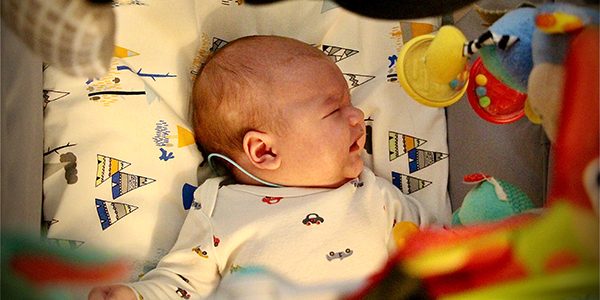It becomes very difficult for parents when babies cry. New parents often panic, stress, worry, and sometimes cry for not being able to soothe a crying baby. The struggle of parenting is real because no books can give a solution and there isn’t really a checklist. Every baby is unique but there is one thing all babies have in common, that is crying. The little whining, of course, vary from one baby to the other but most parents have to deal with crying baby every day.
Why do babies cry? The simple answer is – crying is the baby’s early and only way of establishing their presence and communicating their needs and wants. Offspring of mammals’ cry as a sign to indicate their parent’s immediate attention. When babies cry, the mom or dad responds to them quickly.
It is very normal for babies to cry for 2-3 hours a day for the first 6 weeks of life. According to experts, babies cry a lot during their first 3 months compared to any other time. So, if you are an expectant mother or have just given birth, get ready to deal with crying babies.
Crying is beneficial for the baby because she can easily release tension. It enables her to get rid of other sounds that don’t suit her. Sometimes, crying serves useful purposes like calling out for help, seeking attention, and so on.
Common Reasons Why Babies Cry and Simple Soothing Techniques for New Parents
1. Hunger
Babies cry when they are hungry. It is easy for parents to differentiate hunger cries because it is often rhythmic, repetitive, and low-pitched. When babies cry due to hunger, their tongue hits the roof of the mouth in search of milk and makes a “neh” sound.
Solution: You must always plan the baby’s feeding schedule according to the baby’s hunger cues. Crying is the last stage of hunger. Look out for early signs of hunger such as lip smacking, sucking on their hands, and rooting (trying to find the breast or bottle) to prevent the baby from crying.
2. Burp
If babies cry right after feeding, it is a sure sign they need to burp. You need to burp the baby after every feed. Some babies need it after having hiccups, crying, or sucking a pacifier. They swallow air after these activities, so when babies cry, pat them on the back.
Solution: There are different burping techniques you may follow. The simple technique is to hold the baby upright on your shoulder and gently pat their back. Usually, after two or three tries, you may get a loud burp.
3. Sleep
Adults adapt to a sleeping pattern, but babies don’t have one. Sleep is a skill that we learn over time. Not to forget insomnia and other sleep disorders. Newborns don’t have a sleep pattern until 4 months. They have difficulty falling asleep without stimulation. It takes a lot of effort, trial, and error to help babies fall asleep at night. Until they follow a pattern, it can be difficult for parents to make their babies sleep. Babies cry a lot at night and they wake up very frequently. Overtired babies also have difficulties sleeping because their bodies will produce hormones that keep them awake.
Solution: It can be tempting to cut down baby’s nap during day time. But unfortunately, it won’t solve the problem. Firstly, it is better to allow a sleepy baby to sleep without keeping them away. Secondly, swaddling newborns will help. Some babies also respond well to rocking motions, the sound of music, or even humming.
4. Tummy Trouble
If your baby is frequently arching her back, pumping her legs, wriggling, or twisting, it is a sign of gas. Babies cry due to the trapped gas in their tract.
Solution: You can help babies pass the gas by holding the baby on the left side. You can even cycle their legs to relieve the gas.
5. Colic Pain
Babies cry a lot with colic. The cries can be loud, uninterrupted, and never-ending. It can be stressful for both the mom and the baby. They have disrupted sleep and constant crying. Colic is normal, even for healthy babies. Your baby may draw up her knees, arch her back or even clench her fist when she is in colic pain. Experts think that it is a normal developmental stage. Colic can also be a result of allergy, intolerance, wind, reflux, or constipation.
Solution: Though there isn’t anything you can do about it; you need to learn to deal with the baby. Hold the baby in their favorite position to soothe the pain.
6. Dirty Diaper
Some babies cry over dirty diapers and others don’t. For a few, dirty diapers make them fussy and cry out loud. If babies cry a lot, quickly open the diaper, or do a “sniff test.”
Solution: You can buy diapers with a wetness indicator to investigate and change them quickly.
7. Teething
Teething begins at the age of 4 months and you will notice babies cry along with excessive drooling. They also tend to bite anything within reach. It may be tempting to give them over-the-counter medicine to relieve pain, but natural relief is better unless the baby is in miserable pain.
Solution: Sucking a pacifier or thumb can calm them down. You can also give them a gum massage or allow them to check the frozen teether. Consult your pediatrician (if needed) to give weight-appropriate doses for teething in babies.
8. Sensory Overload
Overstimulation can make babies cry. For example, when a baby is getting passed around by aunts and uncles at a party, they start to feel uncomfortable and overloaded. As a result, they start crying out loud.
Solution: Crying babies will settle on their own if they get some fresh air. You can also go for a walk or take them home to relax.
9. Temperature
Babies cry when they feel too hot or too cold. Always set the temperature between 16 degrees to 20 degrees. Sometimes babies feel hot under the blankets and become overheated. It is also normal for them to feel colder than the rest of them at home.
Solution: Do not overdress or underdress your baby. Use cotton sheets and just one layer of additional cloth to comfort them. Always follow the baby’s cues to find out if they are happy with their clothing.
10. Boredom and Attention
Babies cry to seek attention or when they are lonely. For example, if babies spend quite a lot of time playing around with the same toys, they get bored and start crying. They even try to cry when their parents are not around while on the swing or bouncer.
Solution: Allow babies to play alone and reach out to help when they start showing signs of discomfort. The smell of the mother can be very comforting for the baby so try to spend time with newborns until they get used to playing and sleeping alone.
11. Sickness
Sick babies cry a lot due to pain, discomfort, and the changes that happen within them. If your little one is sick, you’ll notice them crying more often. Parents will often know the “sick crying.”
Solution: Check for symptoms such as vomiting, fever, rashes, and so on. Bring it to your doctor’s attention immediately. Breastfeeding a baby can also soothe them when they are sick.
12. Discomfort
Any kind of major and minor discomfort can make a baby cry. For example, irritation of clothes, hair stuck on their body, or a wet blanket can make them cry. A new environment, new dress, or new place can also cause them insecurities and discomfort.
Solution: If the baby doesn’t stop crying even after trying different soothing techniques, it is better to strip the baby and inspect for rashes, insect bites, or other small things that could have gone wrong.
How Can You Deal with Crying Babies?
You can soothe babies by addressing their needs. If you aren’t sure why they are crying, you will often miss the chance to solve the real problem. It will end up with babies crying more loudly and intensely. Here are some tried and tested techniques you can follow to soothe the baby.
- Swaddle – It reminds them of their days in the womb so most babies love it a lot.
- Side or Stomach Hold – Hold the baby on their side/tummy in your arm position to comfort them. This will resolve any kind of tummy problems and gas.
- Shush/Hum – Gentle shushing or humming their favorite tune can calm them down.
- Rock the Baby – Try gentle rocking or swinging to comfort your baby.
- Suck – Use a pacifier to help relax a fussy baby.
Should You Let Your Baby Cry?
It is hard for any parent to hear their little one cry. But there are times when you should let them cry. For example, it is okay for babies to cry when adapting sleep training, trying new food, or learning new habits. It can be difficult for both parents and the babies but remember, letting them cry doesn’t have a long-term effect. It has got nothing to do with the parent-child relationship.
Babies less than 6 months of age need immediate attention. But you can be a little lenient with older babies because they try to learn self-soothing techniques. It is okay to let your baby cry out loud while you take a quick shower or eat your lunch as long as they are in a safe place.
If the baby won’t stop crying even after trying all possible techniques, take them to a different place (room), go for a quick walk, or change their dress. If you’ve reached your limit, it is okay to put them in a safe place and take a little break. Compose yourself and do not get angry. Ask for help from your partner, friend, or family because parenting is not simple.

























